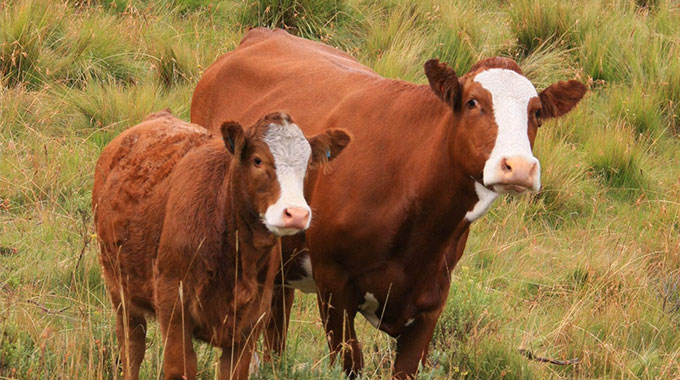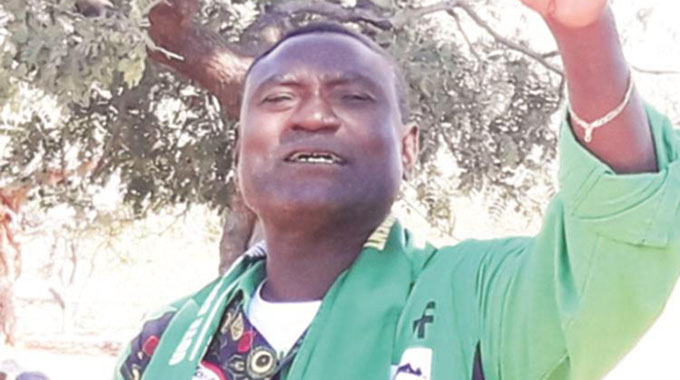Scheme to save Matabeleland cattle launched

Mashudu Netsianda, Senior Reporter
GOVERNMENT has released funds to procure hay harvesting equipment for the two provinces of Matabeleland as part of efforts to mitigate the effects of drought and boost livestock production in the region.
Speaking soon after Vice President Constantino Chiwenga’s tour of Arda Jotsholo Irrigation Scheme in Matabeleland North last Friday, Lands, Agriculture, Water and Rural Resettlement Minister Perrance Shiri said the Government noted that the region, whose economic mainstay revolves around livestock production, was the worst affected by drought and the effects of climate change.
Statistics indicate that as at February this year, 21 400 cattle in the two Matabeleland provinces had succumbed to drought. Matabeleland South recorded 15 180 deaths while 6 220 deaths were recorded in Matabeleland North.
Most animals succumbed to starvation due to depleted grazing fields and diminished water sources.
Minister Shiri said as part of measures to save livestock from total wipeout, Treasury released money to buy baling equipment.
He said the District Development Fund (DDF) and the Zimbabwe National Water Authority (Zinwa) will continue to drill boreholes for livestock and domestic consumption in the affected areas.
“We have secured money from Treasury to buy hay baling equipment and that equipment is targeted at the two Matabeleland provinces. We are very much alive to the fact that we didn’t get enough rains in this region and livestock will be struggling hence we need to provide supplementary feed, which is why we embarked on that approach,” said Minister Shiri.
“This region does well in terms of livestock production and I am talking of cattle, goats and sheep.”
Minister Shiri said his ministry is now working on how the equipment will be disbursed to the farmers.
“We haven’t come up with the modus operandi of saying are we going to distribute the equipment to farmers or is it going to be held centrally by the Veterinary Department from where farmers would go and hire that equipment in order to harvest hay,” he said.
“Along our highways, we tend to have a lot of biomass, which can actually be harvested and used as stock feed for our cattle. If there isn’t enough biomass in Matabeleland nothing should stop us from going to other provinces to harvest.”
The Minister said livestock is the mainstay economy for the region hence the need to come up with mechanisms of saving it.
“We need to pay special attention to issues to do with livestock. In terms of water, we will try as much as possible to harvest water wherever we can identify suitable sites for dams and it will be a priority to build those dams,” he said.
Minister Shiri said Government will continue to channel more resources towards mechanisation of agriculture in order to boost productivity.

Minister Perrance Shiri
“We need to promote and sustain a viable agricultural sector through the provision of appropriate agricultural infrastructure and mechanisation so that we optimise agricultural productivity and ensure food security.
‘We will continuously mechanise and we are receiving tractors from Belarus and John Deere and these are now going to be accessed through various financial institutions such as Agribank, CBZ and many other banks and farmers should apply,” he said.
“Previously, my ministry used to allocate the tractors, but whenever the commodity is scarce you are never considered to be fair and all those who failed to receive the tractors alleged that there was favouritism on our part hence we have decided that we need to bring banks on board.”
Minister Shiri said banks will, however, be regulated in terms of charging interest rates and collateral.
“The equipment itself shall be used as collateral and if banks feel that it is not enough Government will chip in and provide collateral, but farmers are supposed to own up their obligations because if you don’t, we will come and repossess that equipment,” he said.
Minister Shiri said the ministry was in the process of rehabilitating dilapidated irrigation systems to ensure that all water bodies in the country were fully utilised for the benefit of the country.
He said there was need for Government to put in place a robust system where rural communities participate in local and export markets through active involvement in traditional cropping programmes as well as horticulture value chains that create sources of continuous income to sustain their decent livelihoods.
“For a number of years, we have been importing maize and wheat yet we have fertile soil, water bodies and farmers. We are encouraging farmers in areas surrounded by water bodies to take advantage of that and develop irrigation infrastructure so that we can grow the much needed winter wheat and other summer crops both food and non-food crops,” he said.
The Minister said there was need to adapt smart agriculture such as the use of irrigation and other various water harvesting techniques.-@mashnets












Comments